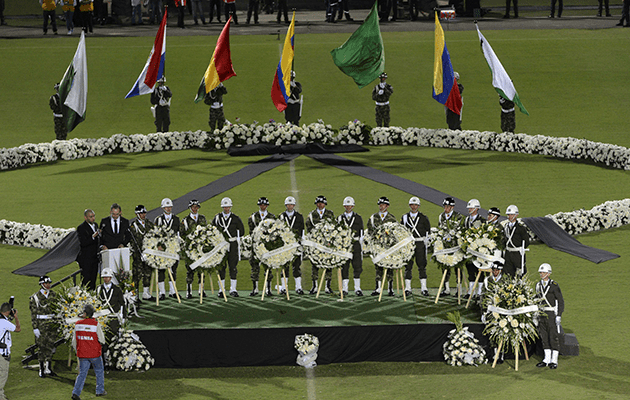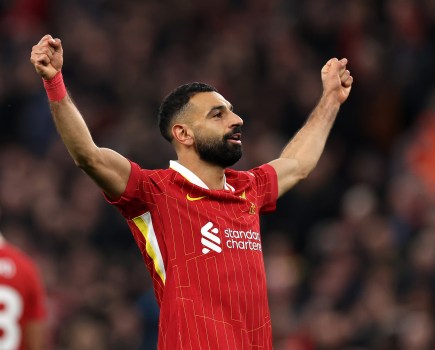The Atanasio Giradot stadium deserved some joy.
Last Wednesday the ground in Medellin was packed, with thousands left outside, as the Colombian public gathered to pay tribute to those who lost their lives in the Chapecoense air disaster. It was a deeply moving ceremony, and a show of solidarity that left Brazilians in awestruck gratitude. The only connection between Medellin and Chapeco was the game of football which was to have been taking place at that time on Wednesday evening. And with Medellin efficiency and a warm Colombian heart, Nacional – as well as requesting that the title of the Copa Sudamericana be awarded to Chapecoense – had put together a sincere and touching tribute.
On Saturday the fans were back in the Atanasio Girodot, this time to cheer on Nacional in the second leg of their local league quarter final against historic rivals Millonarios of Bogota. With a reserve side they had lost the away leg 2-1. Now they had the first team out, warming up for the Club World Cup in Japan. And with two late goals they won 3-0 and sent their fans home happy.
It was fitting that the second goal – effectively the clincher – was scored by veteran left back Farid Diaz, whose wife had spoken so eloquently during the ceremony. In effect she spoke for the worldwide football community, telling of how her own experience as the wife of a player made it so easy for her to relate to the pain being felt down south in Brazil.
In the dressing room after the game the exultant Nacional players chanted the name of Chapecoense. It was the outpouring of a group who had managed to channel the intense emotion of the last few days.
And this, to an even greater extent, is now the task of Chapecoense. Acting president Ivan Tozzo is striking a defiant note. “The dream is not over,” he says. It will be extremely difficult to regain the momentum of the last few years – a decade ago Chapecoense were outside Brazil’s four national divisions, and yet the accident occurred on their way to become the first Brazilian club to take part in a continental final since 2013. How can they come to that? Torino, for example, have seldom hit anything near the heights of their great side wiped out in the 1949 air crash, and they are a much bigger club.

Chapecoense players who did not travel with their team on a flight to Colombia that crashed, mourn during a tribute to the crash victims
Nevertheless, Chapecoense have to try. All of that emotion needs to be channelled – as Bobby Charlton makes clear in his wonderful ‘My Manchester United Years’ memoirs.
The Munich air crash of 1958, he says, was the defining moment of his life. It could never be forgotten, only lived with. But how? “United was no longer a great football club,” he writes. “It embodied that experience, it was a dream that needed to be reawakened.”
Carrying on the fight, of course, cannot bring loved ones back. But it can give meaning to the existence of those who remain. “Looking back,” says Charlton, “I see that this feeling of renewal, the idea that something could still be made out of the future, did more than anything to get me over the worst of the memories.”
On making it back to Manchester after the disaster, “very soon,” says Charlton, “it was clear that everyone at the club needed one thing to happen more than anything. They needed another match, some sense of continuity, some belief that, however haltingly, the club was moving forward from the worst of the grief…. I had to start playing at the first possible opportunity.”
The last round of the Brazilian Championship, scheduled for Sunday 4th, was put back to the 11th. The games will go ahead, with the possible exception of Chapecoense’s meeting with Atletico Mineiro. Many seem to think that this match should not happen, and Atletico have already said that they will not send a side.
But it should not be their decision. It should be up to Chapecoense.
Of course, Chapecoense would struggle to put out any kind of side. But this would be a match in which the result would not be of the slightest relevance. The objective would merely be to take the first step on the way back – and to allow the local public to gather in search of joy at a stadium which in the last few days has been a place of mourning.
Of course, Chapecoense’s loss is even greater than that of Manchester United in 1958. A smaller club have taken a bigger hit, and they would be justified in deciding that they need more time before taking the field. But if they do want to play the game on Sunday, then Atletico Mineiro should be proud to be their first post-disaster opponents.







